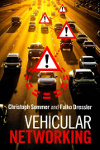Cooperative Mobile Systems 2020s [CMS 2020s]
L.079.05811, Summer 2020
Contents
Vehicle-to-everything communication can serve as the basis for novel applications enabling cooperation among mobile systems of the future. Trucks, cars, bikes, pedestrians, and cities are all part of such a system. This course will cover the basis and the application of communication concepts to the design of such cooperative mobile systems. A practical part covers the application of learned theroetical concepts to the design of novel cooperative mobile systems, as well as the study of such systems via simulative performance evaluation.
Prerequisites
This class will have substantial online components. To be able to join, you must be able to make use of
- your university e-mail mailbox, reading its messages daily
(e.g., by configuring it to forward to your private mailbox) - PANDA and associated services, reading its messages daily
(e.g., by configuring e-mail notifications) - web chat systems, particularly via the IRB chat server
- web video conferencing systems, particularly via the IMT Jitsi Meet server
Before enrolling, please try these out and contact us if you do not fulfill these requirements.
Beyond this, there are no formal prerequisites for joining. Still, certain background knowledge is not taught in this course, but assumed for all of lecture, labs, and exams.
- You should have a background (or the willingness to learn) computer networking with a focus on wireless as well as fundamental knowledge of applied statistics.
- For the labs, simulations will be designed, written (in C++), and run (on Linux systems). For this, both programming and computer skills are essential.
You can take a brief self-assessment test to get an impression of whether you have a solid grasp of the most basic background knowledge.
Learning Outcome
Students will be able to understand how vehicle-to-everything communication can serve as the basis for applications enabling cooperation among trucks, cars, bikes, pedestrians, and cities. They will also be able to apply this knowledge to the design of future cooperative mobile systems - both in theory and in practice.
General Information / Methods
This master course will be held in English and all the course material is available in English. Oral exams can be organized in English as well as in German. The teaching platform for this course is PANDA: https://panda.uni-paderborn.de/course/view.php?id=11112
- (Lecture: 2 SWS, Labs: 3 SWS)
Instructors
- Lecture: Christoph Sommer
- Labs: Tobias Hardes
Schedule
This course consists of lectures and labs. The lecture covers theoretical parts of the course, the labs cover practical parts.
- Lecture:
- We meet every Wednesday, 11-13h online (see PANDA for link to chat room). Our first meeting will be on 8 Apr 2020 (i.e., two weeks before lectures start).
- Labs:
- Group 1: Mondays, 14:00-17:00, online
- Group 2: Tuesdays, 08:00-11:00, online
- Our first meeting will be on 6/7 Apr 2020 (i.e., two weeks before lectures start).
Exams
Oral examination (by appointment). Successful completion of all labs is a prerequisite for taking the exam ("Studienleistung").
Lecture
Course organization will likely be similar to last semester’s course.
Labs
Lab organization will likely similar be similar to last semester’s course.
We provide a virtual machine we call Instant CMS. The machine is available as a virtual machine disk or as an ova-file on the IRB file server. You can download this VM and use it for all lab sessions.
- All lab assignments and instructions for the virtual machine are available via PANDA: https://panda.uni-paderborn.de/course/view.php?id=11112
- Lab assignments are turned in via PANDA: https://panda.uni-paderborn.de/course/view.php?id=11112
Literature
-

 Christoph Sommer and Falko Dressler, Vehicular Networking, Cambridge University Press, 2014.
[DOI, BibTeX, Details...]
Christoph Sommer and Falko Dressler, Vehicular Networking, Cambridge University Press, 2014.
[DOI, BibTeX, Details...]
-
Averill M. Law, Simulation, Modeling and Analysis, ed. 4, Singapore, Singapore, McGraw-Hill, 2007.
-
Ronald E. Walpole, Raymond H. Myers, Sharon L. Myers and Keying Ye, Probability and Statistics for Engineers and Scientists, ed. 9 (international), Pearson, 2012.